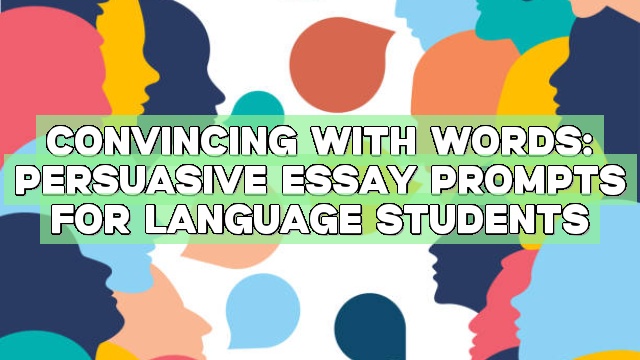Learning a new language can be challenging, but incorporating persuasive essay prompts into language learning tasks can make the process more engaging and rewarding. Persuasive essay prompts encourage language learners to develop their writing, speaking, listening, and critical thinking skills while expanding their vocabulary and mastering persuasion techniques.
Key Takeaways:
- Persuasive essay prompts can help language learners improve their language learning skills.
- Persuasive writing is an essential aspect of language learning and can enhance language skills in writing, speaking, listening, and critical thinking.
- Using ChatGPT for language learning tasks can provide instant feedback and assistance.
Enhancing Language Skills Through Persuasive Writing
Persuasive writing is an essential skill for language learners seeking to improve their language skills. By engaging with persuasive essay prompts, language learners can enhance their writing, speaking, listening, and critical thinking skills, thereby becoming more effective communicators in their target language.
One of the primary benefits of persuasive writing is the opportunity to practice writing in a structured and organized manner. With persuasive essay prompts, language learners can practice developing strong thesis statements, organizing their arguments into clear and concise paragraphs, and using transitional phrases to smoothly connect ideas.
In addition to writing skills, persuasive writing can also help language learners improve their speaking and listening skills. By practicing persuasive techniques such as using rhetorical questions or emotional appeals, learners can learn to speak persuasively and effectively in their target language. Similarly, by listening to or reading persuasive arguments, learners can improve their comprehension skills and learn to identify and analyze persuasive techniques used by others.
Persuasive writing also requires critical thinking skills, as learners must evaluate evidence and use reasoning to support their arguments. This process can help learners develop more robust critical thinking skills and apply them to other areas of language learning and beyond.
Examples of Persuasive Essay Prompts for Language Learners
Here are a few examples of persuasive essay prompts specifically designed for language learners:
- Should students be required to learn a second language in school?
- Is it better to learn a second language through immersion or in a classroom?
- Do social media platforms have a responsibility to filter users’ content for hate speech?
These prompts cover a range of topics and can be adapted for different proficiency levels, from beginner to advanced.
Using ChatGPT for Language Learning Tasks
ChatGPT is a powerful text-generating tool that can be utilized by language learners to augment their learning experience. It offers a wide range of language learning tasks that can assist in developing the four fundamental skills – reading, writing, listening, and speaking – and provides instant feedback that can help learners identify and rectify their errors.
| Benefits of Using ChatGPT for Language Learning Tasks |
|---|
| Instant Feedback: ChatGPT provides immediate feedback on grammar, vocabulary, and syntax errors, allowing learners to correct their mistakes in real-time. |
| Task Variety: ChatGPT offers a wide range of language learning tasks, such as writing prompts, translation exercises, and conversation practice, catering to different learning preferences. |
| Personalized Learning: ChatGPT can customize its responses based on the learner’s level of proficiency, providing exercises with an appropriate level of difficulty. |
| Flexible Learning: ChatGPT can be accessed anytime and anywhere, making it ideal for busy learners who cannot commit to a fixed schedule. |
How to Utilize ChatGPT for Language Learning Tasks
Using ChatGPT for language learning tasks is straightforward. All you need to do is enter your prompt, question, or sentence in the ChatGPT interface, and it will generate a response that you can evaluate and use to improve your language skills.
Here are some tips on how to make the most out of ChatGPT for language learning tasks:
- Set Clear Goals: Identify specific learning goals you want to achieve using ChatGPT and focus on tasks that align with those goals.
- Practice Consistently: Regular practice is essential to improve language skills. Aim for at least 15-30 minutes of practice daily using ChatGPT.
- Experiment with Different Tasks: Try different types of language learning tasks offered by ChatGPT to find out which ones suit your learning style best.
- Review Your Progress: Keep track of your performance and progress by regularly reviewing the feedback provided by ChatGPT.
Overall, ChatGPT provides an innovative and effective approach to language learning tasks, empowering learners with the flexibility, personalization, and instant feedback needed to achieve fluency.
Incorporating Persuasive Essay Prompts in Language Learning
Using persuasive essay prompts can be a valuable tool for language learners to improve their writing and speaking skills while expanding their vocabulary. Here are a few practical tips for incorporating these prompts into your language learning routine:
Set Realistic Goals
Start by setting realistic goals for yourself. Determine how many essay prompts you want to complete per week and create a schedule to keep yourself accountable. This will help you stay on track and make steady progress.
Organize Your Ideas
Before you begin writing, take some time to organize your ideas. Jot down your main points and supporting evidence. This will help you stay focused and make sure your essay is cohesive and well-structured.
Use Persuasive Writing Techniques
When writing your essay, use persuasive language and techniques to make your arguments more compelling. This can include using rhetorical questions, citing credible sources, and using emotional appeals.
Practice, Practice, Practice
The more you practice, the better you will become at persuasive writing. Challenge yourself to write essays on a variety of topics with different levels of difficulty. This will help you develop a range of persuasive techniques and improve your language skills overall.
By incorporating persuasive essay prompts into your language learning routine, you can improve your writing and speaking skills while expanding your vocabulary. With practice and persistence, you can become a more effective and confident communicator in your target language.
Prompt Examples for Language Learners
Here are some examples of persuasive essay prompts specifically designed for language learners:
- Do you agree or disagree with the statement “Learning a second language is essential for success in today’s global economy”? Provide reasons and examples to support your viewpoint.
- Imagine you are a tourist visiting a foreign country. Write a persuasive essay convincing the locals to adopt a more environmentally friendly lifestyle.
- Should schools require students to learn a second language? Why or why not? Use evidence to support your argument.
- Write an essay persuading your classmates to volunteer their time to help their local community. Explain how volunteering can benefit both the community and the individual.
- Some people believe that social media is a waste of time, while others think it is a valuable tool for communication. Take a stance and persuade your readers to agree with your viewpoint.
These prompts cover a wide variety of topics and complexity levels, providing language learners with opportunities to practice persuasive writing in a meaningful context. By engaging with these prompts, learners can improve their vocabulary, critical thinking skills, and overall proficiency in the target language.
Analyzing Responses from ChatGPT
One of the most significant advantages of using ChatGPT for language learning tasks is the instant feedback and assistance it provides to the users. When using persuasive essay prompts for language learning, analyzing the responses generated by ChatGPT can be an essential part of the learning process.
As language learners engage in persuasive writing tasks, ChatGPT generates responses based on their inputs. These responses can be analyzed to assess the accuracy and relevance of the written content, providing critical insights into language proficiency and proficiency in persuasion techniques. By identifying areas for improvement, learners can work towards refining their writing skills and mastering persuasive techniques.
It is important to note that ChatGPT responses may not always be perfect and may require some corrections. However, with consistent usage and analysis, users can learn to identify their mistakes and improve their language skills over time. Additionally, ChatGPT can provide additional prompts and suggestions to guide learners in the right direction, expanding their knowledge and deepening their understanding of various language concepts.
For language learners to effectively analyze responses from ChatGPT, they should consider the following:
- Review the generated responses carefully to identify areas that require modification
- Consider the feedback provided by ChatGPT and make adjustments accordingly
- Examine the use of vocabulary, grammar, and persuasion techniques
- Identify areas of strength and weakness to improve future writing exercises
By incorporating these strategies, language learners can use ChatGPT’s responses as a tool for enhancing their persuasive writing skills, learning from their mistakes, and becoming more confident in their language abilities.
Leveraging ChatGPT for Complex Language Learning Tasks
Language learners often face challenges with complex tasks that require extensive research, critical thinking, and persuasive writing skills. However, with the advancement of AI technology, tasks that were once deemed complex can now be tackled efficiently with the help of ChatGPT.
When approaching complex language learning tasks, it’s essential to break them down into smaller, manageable prompts. This strategy not only makes the task less daunting but also enables learners to focus on specific language skills they need to improve.
With ChatGPT, learners can access an extensive database of information that provides necessary background knowledge and explanations to support the persuasive writing process. Whether it’s finding relevant sources, generating ideas, or refining persuasive techniques, ChatGPT can offer quick and instant feedback to help learners stay on track.
Utilizing ChatGPT for Complex Tasks
Here are some ways learners can use ChatGPT to tackle complex language learning tasks:
| Task | Strategy |
|---|---|
| Researching a Topic | Use ChatGPT to find relevant sources and background information for the topic. |
| Generating Ideas | Utilize the brainstorming feature in ChatGPT to generate ideas and expand on them. |
| Structuring the Essay | ChatGPT can assist in organizing ideas and creating an outline for the essay. |
| Refining Techniques | Use ChatGPT to refine persuasive techniques such as rhetorical devices, logical reasoning, and emotional appeals. |
Overall, ChatGPT is a valuable tool for language learners to leverage when tackling complex tasks. Its ability to provide quick and instant feedback, support in research and generating ideas, and refining persuasive techniques make it an indispensable asset in language learning.
Expanding Vocabulary with Persuasive Essay Prompts
One of the many benefits of engaging in persuasive essay prompts for language learners is the opportunity to expand their vocabulary. By utilizing persuasive language and persuasive techniques in their writing, language learners can effectively introduce new words and phrases in a meaningful context. This not only supports their language learning process but also enhances their ability to express their ideas and opinions persuasively in different situations.
When designing persuasive essay prompts, it is important to include various types of persuasive language and techniques. For example, prompts that require the use of persuasive language, such as using loaded words or phrases, exaggerating ideas, and comparing or contrasting concepts, can help language learners familiarize themselves with new vocabulary and its usage. Additionally, prompts that focus on persuasive techniques, such as rhetorical devices, logical reasoning, and emotional appeals, can help language learners expand their vocabulary by introducing new ways of expressing their ideas.
Furthermore, persuasive essay prompts that are relevant to language learners’ interests or experiences can also encourage them to use specific vocabulary related to their personal experiences and fields of interest. This can promote deeper understanding and retention of vocabulary, as learners are more likely to remember words and phrases that are relevant to their lives.
Overall, persuasive essay prompts are a valuable tool for language learners looking to expand their vocabulary. By engaging in persuasive writing, learners can practice using new words and phrases in a meaningful context and develop their ability to express their ideas persuasively.
Advancing Persuasion Techniques in Language Learning
Persuasion techniques in language learning can help learners communicate their ideas effectively and convincingly. As learners progress in their language skills, they can also advance their persuasion techniques to become more proficient in their communication skills.
One technique that language learners can use to advance their persuasion skills is to use rhetorical devices. Rhetorical devices are language techniques that evoke emotions and engage the audience. Examples of rhetorical devices include similes, metaphors, and imagery.
Another technique that language learners can use to advance their persuasion skills is to utilize logical reasoning. Logical reasoning involves using facts, statistics, and evidence to support an argument. By using logical reasoning, learners can make their arguments more compelling and persuasive.
Finally, language learners can advance their persuasion skills by using emotional appeals. Emotional appeals involve appealing to the emotions of the audience. This can be achieved through the use of personal anecdotes, emotional language, and stories.
By incorporating these advanced techniques, language learners can become more proficient in their persuasion skills and communicate their message more effectively. Moreover, the use of persuasive essay prompts can provide ample opportunity for learners to practice and improve on these techniques.
Mastering Persuasive Writing with ChatGPT
ChatGPT can be a powerful tool for mastering persuasive writing skills in language learning. Here are some tips for utilizing ChatGPT to enhance your persuasive writing abilities:
- Practice writing prompts: Use ChatGPT to generate persuasive essay prompts on a regular basis. Set a goal to write a certain number of essays per week or month and use ChatGPT to kickstart your writing process.
- Receive instant feedback: ChatGPT can provide instant feedback on the quality of your writing. Use the generated responses to identify areas for improvement and refine your persuasive techniques.
- Experiment with different strategies: ChatGPT can help you experiment with different persuasive writing strategies, such as using rhetorical devices, emotional appeals, or logical reasoning. Try out different techniques and assess their effectiveness.
- Refine your language skills: ChatGPT can assist in refining your language skills by suggesting synonyms and antonyms, correcting grammar and syntax errors, and providing contextual information for unfamiliar words and phrases.
By incorporating ChatGPT into your language learning routine, you can continually develop and refine your persuasive writing skills. Remember to set goals, experiment with different techniques, and use the generated responses for self-evaluation and improvement.
Overcoming Challenges with Persuasive Essay Prompts
While persuasive essay prompts can greatly benefit language learners, there are also challenges that may arise when working with them. Here are some common challenges and ways to overcome them:
Writer’s Block
One of the biggest challenges for many writers is writer’s block, where they can’t seem to find the words to express their thoughts. To overcome this challenge, it can be helpful to take a break, clear your mind, and try to come back to the prompt with a fresh perspective. Additionally, brainstorming ideas beforehand and creating an outline can help organize your thoughts and make the writing process smoother.
Time Management
Another challenge is managing your time effectively. It’s important to set a realistic deadline for yourself and break down the task into smaller, manageable parts. This way, you can avoid feeling overwhelmed and stay motivated by tracking your progress along the way. You can also utilize tools like ChatGPT to receive instant feedback and assistance, saving you time in the long run.
Seeking Support
Language learning can be a challenging journey, and it’s important to seek support when needed. Joining a language exchange group or seeking feedback from a teacher or tutor can provide valuable insights and help improve your skills. Additionally, practicing regularly and persistently can make a significant difference in the long run.
Overcoming these challenges takes time and effort, but with perseverance and the right tools, language learners can greatly benefit from engaging with persuasive essay prompts. By pushing themselves outside of their comfort zone and embracing the learning process, they can expand their vocabulary, improve their language skills, and master the art of persuasion.
Conclusion: Empowering Language Learners with Persuasive Essay Prompts
Using persuasive essay prompts is an effective way for language learners to enhance their language skills and master persuasion techniques. By incorporating these prompts into their language learning journey, learners can expand their vocabulary, improve their writing, speaking, listening, and critical thinking skills, and become more competent in persuasive writing.
Moreover, ChatGPT can be used as a helpful tool in language learning tasks. It provides instant feedback and assistance, making language learning more engaging and interactive.
Despite these benefits, language learners may face various challenges when engaging with persuasive essay prompts. Dealing with writer’s block, managing time effectively, and seeking support are some of the common difficulties that learners may encounter. However, with dedication and perseverance, they can overcome these challenges and achieve their language learning goals.
In conclusion, incorporating persuasive essay prompts into language learning is an empowering approach that language learners can use to advance their skills. Regardless of language proficiency levels, learners can utilize various prompt examples, chat with ChatGPT, and analyze responses to enhance their persuasive writing and advance their persuasion techniques.
FAQ
Q: What are persuasive essay prompts?
A: Persuasive essay prompts are writing prompts specifically designed to elicit persuasive arguments and opinions from the writer. They typically present a controversial or debatable topic and require the writer to defend a particular position.
Q: How can persuasive essay prompts improve language learning skills?
A: Persuasive essay prompts can improve language learning skills by providing opportunities for language learners to practice writing, speaking, listening, and critical thinking. Engaging with these prompts allows learners to expand their vocabulary, enhance their persuasive language skills, and develop their ability to express opinions and arguments effectively.
Q: What are some examples of persuasive essay prompts for language learners?
A: Examples of persuasive essay prompts for language learners may include topics such as the importance of learning a second language, the impact of social media on society, or the benefits of exercise. These prompts are designed to encourage language learners to engage with relevant and thought-provoking issues.
Q: How can ChatGPT be used for language learning tasks?
A: ChatGPT can be used for language learning tasks by providing instant feedback and assistance. Language learners can interact with ChatGPT in a conversational manner, asking questions, discussing topics, and receiving responses that can help them improve their language skills.
Q: How can persuasive essay prompts be incorporated into language learning?
A: Persuasive essay prompts can be incorporated into language learning by setting goals, organizing ideas, and practicing persuasive writing techniques. Language learners can engage with these prompts by researching and gathering relevant information, structuring their arguments, and writing persuasive essays.
Q: What are some prompt examples for language learners?
A: Prompt examples for language learners may include prompts that require them to argue for or against school uniforms, discuss the impact of technology on society, or persuade others to support a specific environmental cause. These prompts are designed to challenge learners and develop their language and persuasion skills.
Q: How should responses from ChatGPT be analyzed in language learning?
A: Responses from ChatGPT should be analyzed in language learning by evaluating the strengths and weaknesses of the generated responses. Language learners can assess the coherence, clarity, and persuasiveness of the responses, identifying areas for improvement and learning from the generated content.
Q: How can ChatGPT be leveraged for complex language learning tasks?
A: ChatGPT can be leveraged for complex language learning tasks by breaking down the tasks into smaller, manageable prompts. Language learners can use ChatGPT to assist in providing necessary background information or explanations, allowing them to tackle complex language learning tasks with guided support.
Q: How can persuasive essay prompts help expand vocabulary?
A: Persuasive essay prompts can help expand vocabulary by exposing language learners to new words and phrases. Through engaging with persuasive language and techniques, learners are encouraged to incorporate a wide range of vocabulary in their arguments, thereby expanding their lexicon and language proficiency.
Q: How can persuasion techniques be advanced in language learning?
A: Persuasion techniques can be advanced in language learning by engaging with persuasive essay prompts that introduce more sophisticated concepts and strategies. Language learners can explore rhetorical devices, logical reasoning, and emotional appeals to enhance their persuasive writing and communication skills.
Q: How can ChatGPT be used to master persuasive writing?
A: ChatGPT can be used to master persuasive writing by providing language learners with a platform to practice persuasive writing skills, receive feedback, and refine persuasive techniques. Engaging in conversational exchanges with ChatGPT allows learners to experiment and refine their persuasive writing abilities.
Q: What are some common challenges with persuasive essay prompts and how to overcome them?
A: Some common challenges with persuasive essay prompts include writer’s block, time management, and seeking support. To overcome these challenges, language learners can utilize brainstorming techniques, create a writing schedule, break down tasks into manageable steps, and seek guidance from teachers or peers.









